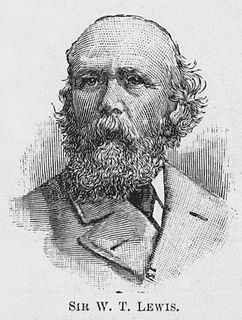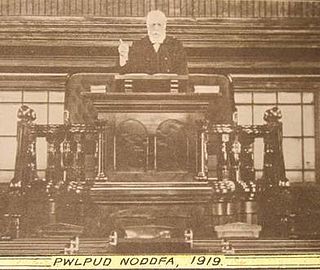Related Research Articles

Rhondda is a constituency represented in the House of Commons of the UK Parliament since 2001 by Chris Bryant of the Labour Party.

William Thomas Lewis, 1st Baron Merthyr, known as Sir William Lewis, 1st Baronet, from 1896 to 1911, was a Welsh coal mining magnate.

Bethania was a Calvinistic Methodist chapel in Aberdare, Rhondda Cynon Taf, Wales, which seated 550 people. Located near the centre of Aberdare, it had a somewhat concealed entrance and was approached up a long flight of steps.
The first election to the Glamorgan County Council were held on 17 January 1889. Results were announced over several days. They were followed by the 1892 election. The authority, by far the largest county in Wales in terms of population, was established by the 1888 Local Government Act. The county of Glamorgan was at this time becoming heavily industrialised although some areas such as the Vale of Glamorgan remained essentially rural.
The Aberdare School Board was formed in 1871 and consisted of thirteen members elected for a period of three years. It was abolished, along with other School Boards in 1902 and its responsibilities transferred to Glamorgan County Council.

David Price (1809–78) was a Welsh Independent minister at Aberdare. He played a formative role in the development of this industrial community during the nineteenth century and, in addition to his religious activities, became a member of the Aberdare School Board and sought to play a conciliatory role during industrial disputes such as the Aberdare Strike of 1857–8.

William Morris, widely known by his bardic name, Rhosynnog, was the minister of Noddfa Baptist Church, Treorchy, South Wales from soon after its formation in 1868 until his death.
The second election to the Glamorgan County Council was held on 8 March 1892. The 1889 election was the first contest and the next was the 1895 election. Glamorgan County Council had been established by the 1888 Local Government Act, and the first election held in January 1889. Glamorgan was by far the largest county in Wales in terms of population. The county of Glamorgan was at this time becoming heavily industrialised, although some areas such as the Vale of Glamorgan remained essentially rural. The rise of nonconformist liberalism, especially since the 1860s, throughout Wales, had challenged the prevailing influence of the landed gentry. However, even in 1889, the traditional forces remained influential and no working men were elected to the Council. This changed in 1892 with the unopposed return of David Morgan in Aberdare and the success of Isaac Evans in Resolven.
Frederick Lewis Davis was a Liberal politician and a member of a notable family of coal owners in South Wales. His grandfather, David Davis, Blaengwawr was a pioneer of the coal trade in the Aberdare valley while his father, Lewis Davis and uncle, David Davis, Maesyffynnon developed the business and were pioneers of the coal trade in the Rhondda, most notably at Ferndale. Having trained as a barrister, Davis joined the family business.
David Morgan was a Welsh miners' agent and trade unionist who played a prominent role in the history of industrial relations in the South Wales Coalfield from the 1870s until his death in 1900.

Idris Williams was an educationalist, prominent Congregationalist, and Liberal councillor for the Cymmer division of the Glamorgan County Council, South Wales.
The Glamorgan County Council election, 1898 was the fourth contest for seats on this authority. It was preceded by the 1895 election and followed by the 1901 election. Glamorgan was by far the largest county in Wales in terms of population. Glamorgan County Council had been established by the 1888 Local Government Act, and the first elections held in early 1889. The county of Glamorgan was at this time becoming heavily industrialised, although some areas such as the Vale of Glamorgan remained essentially rural. The rise of nonconformist liberalism, especially since the 1860s, throughout Wales, had challenged the prevailing influence of the landed gentry. However, even in 1889, the traditional forces remained influential and no working men were elected to the Council. This changed in 1892 with the unopposed return of David Morgan in Aberdare and the success of Isaac Evans in Resolven.
John Jones Griffiths (1839–1901) was an educationalist, Liberal politician and prominent figure in the public life of the Rhondda, Wales.
The Glamorgan County Council election, 1901 was the fifth contest for seats on this authority in south Wales. It was preceded by the 1898 election and followed by the 1904 election. Glamorgan was by far the largest county in Wales in terms of population. Glamorgan County Council had been established by the Local Government Act 1888, the first elections being held in early 1889.
The community of Aberaman, Rhondda Cynon Taf was an electoral ward for much of the twentieth century, for the purposes of electing members to Glamorgan County Council and the Aberdare Urban District Council. It currently comprises two electoral wards, Aberaman North and Aberaman South, for the purposes of electing members to the Rhondda Cynon Taf County Borough Council. Aberaman North is composed mainly of Aberaman itself while Aberaman South includes Abercwmboi, Cwmaman, Godreaman and Glynhafod.
Pontypridd Urban District Council was a local authority in Glamorgan, Wales. It was created in 1894 as a result of the 1894 Local Government of England and Wales Act. The Council existed until 1973 and replaced the Pontypridd Local Board of Health which had functioned for some years. Its boundaries were set in 1894. Initially, the Council had eighteen members but this number was increased in the 1930s, as a result of the increase in population. There were initially six wards, namely Cilfynydd, Graig, Pontypridd Town, Rhondda, Trallwn and Treforest; a seventh ward, Rhydyfelin, was added in the 1930s.
Aberdare Town was, for much of the twentieth century, an electoral ward for the purposes of electing members to Glamorgan County Council and the Aberdare Urban District Council. It currently comprises two electoral wards, Aberdare East and Aberdare West/Llwydcoed, for the purposes of electing members to the Rhondda Cynon Taf County Borough Council. Aberdare East is composed mainly of a part of Aberdare itself while Aberdare West includes the community of Llwydcoed which, for many years was itself as electoral ward.
The community of Llwydcoed, Rhondda Cynon Taf was, for much of the twentieth century, and electoral ward for the purposes of electing members to Glamorgan County Council and the Aberdare Urban District Council. Llwydcoed is no longer an electoral ward but forms part of Aberdare West/Llwydcoed electoral ward for the purposes of Rhondda Cynon Taf unitary authority elections
The Aberdare Urban District Council was established in 1894 and covered the parish of Aberdare. Its responsibilities included public health, sanitation, roads and public works generally.
Owen Harris was a Liberal politician and municipal leader in Aberdare, South Wales.
References
- ↑ "Etholiad Bwrdd Ysgol Ystradyfodwg". Tarian y Gweithiwr. 1 November 1878. Retrieved 26 February 2014.
- ↑ "TheYstradyfodwg School Board Contest". Pontypridd Chronicle. 29 October 1881. Retrieved 24 March 2014.
- ↑ "Etholiad Bwrdd Ysgol Ystradyfodwg". Seren Cymru. 14 November 1884. Retrieved 25 March 2014.
- ↑ "Etholiad Bwrdd Ysgol Ystradyfodwg". Tarian y Gweithiwr. 20 October 1887. Retrieved 25 March 2014.
- ↑ "Ystradyfodwg School Board Election". Pontypridd Chronicle. 24 October 1890. Retrieved 27 March 2014.
- ↑ "Ystradyfodwg School Board". Evening Express. 24 October 1893. Retrieved 3 April 2014.